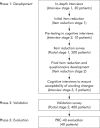Development, validation, and evaluation of the PBC-40, a disease specific health related quality of life measure for primary biliary cirrhosis
- PMID: 15961522
- PMCID: PMC1774759
- DOI: 10.1136/gut.2005.065862
Development, validation, and evaluation of the PBC-40, a disease specific health related quality of life measure for primary biliary cirrhosis
Abstract
Background and aims: Study of health related quality of life (HRQOL) and the factors responsible for its impairment in primary biliary cirrhosis (PBC) has, to date, been limited. There is increasing need for a HRQOL questionnaire which is specific to PBC. The aim of this study was to develop, validate, and evaluate a patient based PBC specific HRQOL measure.
Subjects and methods: A pool of potential questions was derived from thematic analysis of indepth interviews carried out with 30 PBC patients selected to represent demographically the PBC patient population as a whole. This pool was systematically reduced, pretested, and cross validated with other HRQOL measures in national surveys involving a total of 900 PBC patients, to produce a quality of life profile measure, the PBC-40, consisting of 40 questions distributed across six domains. The PBC-40 was then evaluated in a blinded comparison with other HRQOL measures in a further cohort of 40 PBC patients.
Results: The six domains of PBC-40 relate to fatigue, emotional, social, and cognitive function, general symptoms, and itch. The highest mean domain score was seen for fatigue and the lowest for itch. The measure has been fully validated for use in PBC and shown to be scientifically sound. PBC patient satisfaction, measured in terms of the extent to which a questionnaire addresses the problems that they experience, was significantly higher for the PBC-40 than for other HRQOL measures.
Conclusion: The PBC-40 is a short easy to complete measure which is acceptable to PBC patients and has significantly greater relevance to their problems than other frequently used HRQOL measures. Its scientific soundness, shown in extensive testing, makes it a valuable instrument for future use in clinical and research settings.
Figures



References
-
- Jones EA, Bergasa NV. The pruritus of cholestasis. Hepatology 1999;29:1007–12. - PubMed
-
- Goldblatt J, Taylor PJS, Lipman T, et al. The true impact of fatigue in primary biliary cirrhosis: a population study. Gastroenterology 2002;122:1235–41. - PubMed
-
- Huet P, Deslauriers J, Tran A, et al. Impact of fatigue on the quality of life of patients with primary biliary cirrhosis. Am J Gastroenterol 2000;95:760–7. - PubMed
-
- Younossi ZM, Kiwi ML, Boparai N, et al. Cholestatic liver diseases and health-related quality of life. Am J Gastroenterol 2000;95:497–502. - PubMed
Publication types
MeSH terms
LinkOut - more resources
Full Text Sources
Other Literature Sources
Medical
Research Materials
